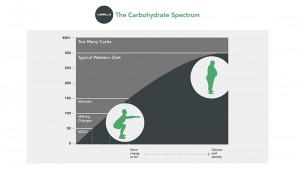Carbohydrates 101
The take home here is limiting the sheer amount carbohydrates you consume daily. This article generalized about carbohydrates but does not go into the specifics of sport – i.e. the CHO recommendations for a yogi vs a bodybuilder are vastly different.
Love them or hate them, carbs are everywhere we look and are often hotly debated. Low-carb diets have had their share of air-time, but we want to explain why some carbs are better than others. Check our where you currently sit on the carbohydrate spectrum.
As you’ll remember from our history lesson on food more than 50% of the world’s food energy comes only a few types of grains. The big three are: wheat, corn and rice1 – all high in carbohydrate. If we are filling ourselves up with this stuff, we might as well find out a little more. Especially with all the extreme messages we receive about carbs.
Pure sugar and starch are refined forms of carbohydrate, a lot of which is found in processed foods. Fiber is healthy stuff we get from whole plants and necessary for our bodies and digestive systems.
When naturally occurring carbs are processed or refined, it removes a lot of protein and fiber and increases calories per bite.The worst thing about these refined carbohydrates is they can affect our hormones, especially insulin. Insulin is a super cool little hormone which affects blood sugar levels, fat storage, and many other processes.
Basically when we eat too many refined carbohydrates like sugars and starch, insulin stops working properly and we can become insulin resistant.2 Seriously scary. Because when your insulin isn’t working right, that can lead to obesity, diabetes type 2 and heart disease.3
But don’t freak out just yet. And don’t go to your cupboard and throw everything away. Well, you can probably throw most things away to be honest. The fact is, if you are asking if you should reduce or even eliminate refined carbohydrates in your diet, the answer is most definitely yes.4-5
Wait! Don’t give up on the article yet – we aren’t saying that you should never have toast again. No one should have to exist like that.
A simple first step is reducing your refined carbohydrate intake. The regular stuff like sugary beverages, white bread and pasta, along with most snack foods that come in a box or bag. Instead of these, think water for drinking, and sweet potato or quinoa and more fiber-rich green vegetables (yes, these contain carbs). Because, (here’s the kicker), if you do this not only will you be controlling your weight and decreasing chances of nasty diseases6, but you simply will feel better on a daily basis! You’ll feel fuller after making more room for protein7, and help to maintain your energy and focus throughout the day. Who doesn’t think this sounds good?
What’s more – less refined carbs means you get to replace them with more delicious green vegetables, proteins and natural fats, (full-fat dairy, nuts, good oils), which will actually give you long-lasting energy.
How much carbohydrate is right for you? There is a spectrum – from extremely low–carb, (less than 50g per day, a diet known as ketogenic), all the way up to the standard American diet, (an excess of 300g of carbs per day). Check out our infographic below of grams of carbs per day and see where you currently fit:
THE CARB SPECTRUM: WHERE DO YOU FIT?
Pretty much everyone can benefit from reducing the over-all carbohydrate levels in their diets. And yes, this means all sources, even the starchy vegetables.
The final point is exercise – when you work out consistently, you are able to process carbs efficiently and keep that insulin doing its thing properly. 8-9. So when you are training hard, don’t feel that you have to cut all the good, whole, fiber-containing carbohydrates like starchy vegetables and legumes.
REFERENCES







